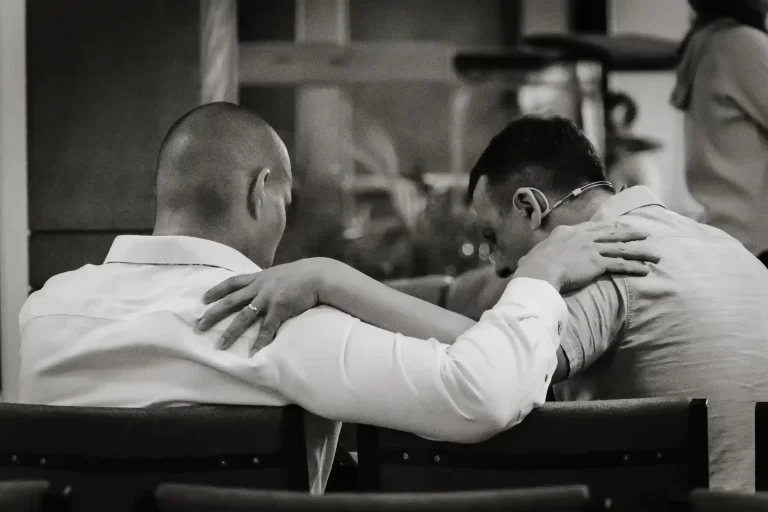
 God loves me. I know this to be true, not only because He created me, but because He also created other people – for me. Others for me to share my life’s excitement and joy with; others for me to be available to support and to be supported by during times of life’s challenges. I’ve discovered that life is best experienced when I’m in community and in healthy relationship with others.
God loves me. I know this to be true, not only because He created me, but because He also created other people – for me. Others for me to share my life’s excitement and joy with; others for me to be available to support and to be supported by during times of life’s challenges. I’ve discovered that life is best experienced when I’m in community and in healthy relationship with others.
But what happens when my relationships begin to fracture and that uncomfortable friction between us settles in? It’s easy for me to say, ‘Well if you would only change, then our relationship would be better, and I would be happy again.” But what might happen if I asked myself, “Am I the problem in my relationships?”
Two are better than one. (Ecclesiastes 4: 9)
Building Successful Relationships

When I find myself in strained relationships, I find it helpful to ask who or what the common denominator might be. Confession … the “who” is often me. To determine what the common thread may be, I’ve created a plumb line against which to gauge my current relationships. Here are the 4 common checkpoints I’ve identified that make my relationships successful.
1. We spend quality time together.
2. My motivation to be in the relationship is correct.
3. We have a common purpose for being in the relationship – and our expectations are realistic.
4. I’ve assigned the relationship the right priority.
To illustrate what I mean by assigning the right priority, I look at Matthew 22:34-40 (NCV):
When the Pharisees learned that the Sadducees could not argue with Jesus’ answers to them, the Pharisees met together. One Pharisee, who was an expert on the law of Moses, asked Jesus this question to test Him: “Teacher, which command in the law is the most important?” Jesus answered, “‘Love the Lord your God with all your heart, all your soul, and all your mind.’ This is the first and most important command. And the second command is like the first: ‘Love your neighbour as you love yourself.’ All the law and the writings of the prophets depend on these two commands.” (Emphasis mine)
These verses are significant to me for 3 reasons. Jesus lists the 2 most important commandants I am to follow; He understands that the foundation I am to have in my key relationships is love; and He also clearly highlights the priority He expects me to have for my relationships:
1. God
2. Myself
3. Others
God created me to be a vessel for His love and He longs for me to be in a relationship with Him. I’m also to love myself. I didn’t say be in love with myself; I am to receive His love, accept it, and then take the over-pouring of His love into me and share it with others. After all, I can’t give away what I don’t have. I am to love others and to be open to being loved upon by others. When I follow the priority He highlights, I’m then able to function best within His design for relationships – being the distributor of love.
Core Needs and Relationships

I love God. God invites me to be in relationship with Him and with others in order to help meet the unique needs He’s placed in me. God created me with physiological needs toward my everyday living like breathing, food, water, and sleep – and He wants me to understand that the ability to meet these needs is dependent upon His grace to me. He also created within me (in fact in everyone – I’m not that special) 4 core human needs:
- Acceptance – My need for approval and attachment; I need to feel connected to and loved by others.
- Identity – My need to feel significant.
- Security – My need for order, predictability, safety, and stability in my life.
- Variety – My need for adventure, excitement, surprises, and even uncertainty. When fulfilled, each of these variety needs provides me with an opportunity to draw closer to God when difficulty arises, and also to give Him praise and thanksgiving when they go well.
I’m in awe when I consider how – consciously or not – each of these needs has been motivating me throughout my life and specifically within the context of my relationships.
There are also 2 other needs I’ve identified that provide me with the structure in my life that move me toward joy and fulfillment:
- Growth – My need for constant emotional, intellectual, and spiritual development.
- Purpose – My need to have meaning; to see my life move from success to significance; to understand that I am to give beyond myself and to care for, protect, and serve others.
Can you relate to any of the above needs? Here’s a question to consider … Who do you seek out to meet those needs? When you look at your past and current relationships with family, friends, those at work, and even your romantic relationship, can you see, like I have, how often you gravitate into relationships with those who you feel can best meet your needs? But what if they can’t? What I’ve come to realize is that only God, through Jesus Christ, can fully and completely meet my needs. After all, God created me, and He knows best how I operate and can be fulfilled. If I’m unable to give Him as the answer, it just might be a clue to the problem I have in my relationships. Besides, placing my expectations on those who weren’t designed to care for or handle them isn’t fair to them.
Why Me? Why You? Why Now?

At my age, I don’t necessarily need more friends. However, I’ve learned to be wise enough (sometimes) to ask myself why God would have brought us together – if even for a season. What would His purpose be? I’ve come to realize that the answer is not always about me. Sometimes I’m brought into relationship for the benefit of the other person; because, apparently, I have something to offer them. Without asking the “why” question, I might never address my motivation for wanting to be in a relationship, specifically when it comes to the need for acceptance. Am I looking to take from the relationship rather than contributing?
Checking the Plumb Line

How do I nurture my core relationships? I spend quality time in them.
- With God … I love Jesus and I spend time in worship and prayer. I lean into Him, allowing Him to direct my life and lead me into the kind of relationships with others that can have a positive impact on those within the church and the community beyond.
- In my time with myself … I initiate a proper self-care strategy, and I understand my identity in Christ.
- As I spend time with others … I give the right people my most treasured time. After God and taking responsibility for and care of myself, my relationship with my wife Teresa is my priority; then my children (sorry, kids); then parents, close friends, church family, and then those near and far who aren’t part of the community of faith – in that order.
Can I challenge you to take time today to evaluate – or reevaluate – the relationships you’re involved in? Review the list of the above strategies toward building successful relationships and understand the unique needs God has placed in you and how He wants you to specifically fulfill those needs. Do you have the order of your relationships in line with God’s Word? If your current relationships are strained, ask yourself, “Am I the problem in my relationship?”
Written by Ron Buschman, Couples’ Ministry Director at First Alliance Church (FAC)



